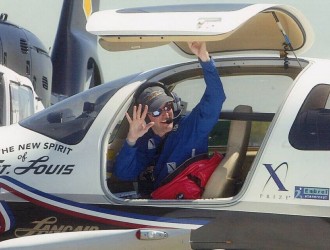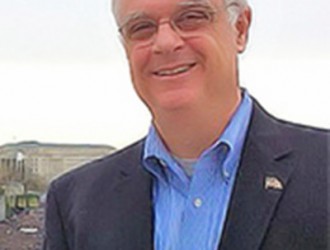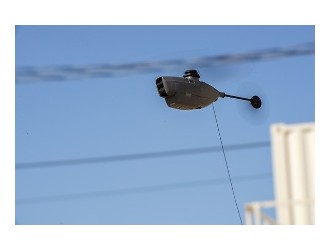
GREEN, Ohio – New Spirit Airlines CEO Bob Fornaro on Thursday called the Akron-Canton Airport the best small airport in the country, and said he anticipates adding new routes to the six the carrier already has announced here.
Fornaro was in town to kick off Spirit's new service at CAK, the ultra-low-cost airline's 58th destination.
To celebrate the launch, and in a nod to the recently finished U.S. presidential election, the airline awarded "four more years" of free Spirit flights to one lucky traveler. Winner Ryan Smith, 22, of North Canton, said he had never flown Spirit – but was looking forward to exploring all six of the airline's Akron-Canton destinations.
"I've never been to most of these places," said Smith, who works at the University of Mount unio in Alliance. "This is an awesome opportunity."
Starting this week: Nonstop routes to Fort Lauderdale, Orlando, Tampa and Fort Myers, in Florida. And coming in April: flights to Las Vegas and Myrtle Beach, South Carolina.
All six routes are already offered by Spirit at nearby Cleveland Hopkins International Airport, about 50 miles north of CAK. Fornaro said Northeast Ohio travelers can support both.
"The area is certainly big enough," he said. "We're comfortable being in both."
Fornaro first became acquainted with the Akron-Canton Airport in the late 1990s, when he was CEO of AirTran Airways. In the 2000s, AirTran built a major presence at CAK, with as many as 12 destinations served daily.
"This was one of our best small airports," said Fornaro. "In fact, it was the best."
Among the reasons why: An airport staff that works hard to market its service. "Their objective is to grow the airport, to grow the pie within the region," he said. "This community can scrap, and so can we as a company."
Until recently, both AirTran and CAK functioned in part as a low-cost alternative to Cleveland Hopkins, which, as a hub airport for Continental and then United airlines, had among the highest fares in the country.
But since United closed its hub in 2014, Cleveland fares have come down dramatically, which has changed the relationship between Northeast Ohio's two major airports. In addition, Southwest Airlines merged with AirTran, and cut most of the service at Akron-Canton.
"Air service in the region has changed," said Fornaro. "So we're doing it differently this time."
Instead of competing, Spirit service at the two airports can be complementary – departing from one and returning to another, for example. In fact, that's what Fornaro and the rest of the Spirit crew did, arriving in Cleveland earlier in the week from the carrier's headquarters in Fort Lauderdale before the CAK service commenced.
A quick survey of departing passengers on Thursday found numerous travelers who were flying on Spirit for the first time. Among them: Julie and Paul Schum of Louisville, east of Canton, flying to Fort Lauderdale for a post-election, long-weekend reprieve.
"Instead of going to Columbus for a long weekend, we said, 'Let's go to Florida,'" said Julie. Round-trip fare: $70 each, plus $8 for an advanced seat assignment.
Their only gripe: They were unaware that Spirit's checked-bag weight limit is 40 pounds, 10 pounds less than many other U.S. airlines. So in addition to the $30 they paid to check their bag, they were assessed another $30 because their bag was overweight.
Fornaro acknowledged that there is a learning curve to flying Spirit. But once customers get familiar with the ultra-low-cost business model, they learn to appreciate it, he said.
Customers who pack light don't have to subsidize those who take several bags; customers who don't want a beverage or a snack don't pay for those who do. "You choose what you want to use," he said.
Fornaro, however, said cheap fares shouldn't equate to lousy service. As CEO, he said he is committed to reducing Spirit customer complaints, which typically have been among the highest in the U.S. airline industry.
Since Fornaro took over in January 2016, the airline has steadily improved its on-time performance. In August, the airline had an on-time performance of 71.8 percent, according to the U.S. Department of Transportation, up from 68.1 percent in January.
"We've got an obligation to the customer," said Fornaro. "No customer signs on for poor service."





